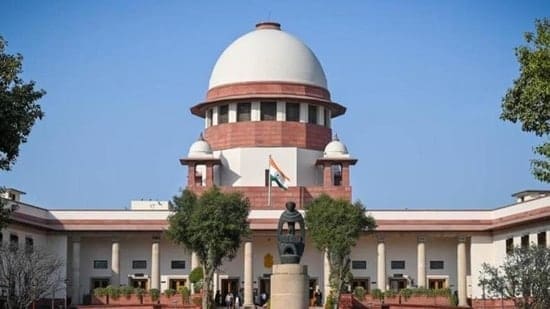
The Supreme Court on Tuesday questioned why financially secure sub-castes of the backward classes should not be “excluded” from the reservation list and pushed to compete with the general category.
A seven-judge constitution Bench led by Chief Justice of India D.Y. Chandrachud argued that since some of the sub-castes among backward classes have emerged better and have progressed economically, they must give up the reservation benefits and participate in the general category.
The bench was hearing pleas on sub-classification within Scheduled Castes, Scheduled Tribes quotas, examining whether states have the power to divide the reservations, reported PTI.
The roots of the case lie in a Punjab government notification from 1975 that divided its 25% reservation for the Scheduled Castes at the time into two categories.
“Why should there be no exclusion [from the reservation list]?, Why stay there?”, Justice Vikram Nath, one of seven judges asked.
In order to make space for more marginalised sub-castes who deserve more care, these already uplifted groups should leave the reservation domain, Justice Nath said.
“The remaining sub-castes who are still backward, let them have reservations,” he added.
According to Chief Justice Chandrachud, the removal of affluent groups is not against the spirit of reservation as “exclusion” is implicit in the concept of reservation.
He observed that the forward classes were necessarily excluded while reserving seats for backward classes.
This positive discrimination was approved by the constitution in pursuit of substantive equality and not formal equality, the Chief Justice added.
Justice BS Gavai, on the other hand, repeated the archetypal argument against reservation and asked whether the children of civil service officers from SC and ST should continue availing reservation facilities, as reported by Bar and Bench.
“What happens is a person from Scheduled Caste or Scheduled Tribe gets into IAS, IPS. Once he is an IAS or IPS or IFS, his children no more suffer the disadvantages that the persons from the category who are residing in the villages but then by virtue of reservation they are also entitled to get it in second generation or third generation,” he claimed.
Senior Advocate Kapil Sibal contended that such persons would be designated as the creamy layer.
The constitution does not define that reservation as perpetual. Failing to provide extra benefits to relatively more backward people within a category, would lead to “lumping of benefits” within that class, he said, as quoted by the Indian Express.
The Case of Punjab
The Punjab government maintained its stance that States were empowered to identify sub-castes within the SC category and grant them more reservation if they were “relatively more marginalised than the marginalised”.
Punjab Advocate-General Gurminder Singh argued that, if communities could be classified into general and backward and, the same rule could be applied on the Scheduled Castes and Scheduled Tribes.
Additional Advocate-General Shadan Farasat observed that sub-classification deepens the impact of reservation, and helps in reaching out to all the backward groups.
“We have not yet seen what true efficiency is because we are yet to arrive at true equality… The statehere is helping the weakest person. The stateshould be inclusive… After all, the business of the stateis its people,” he argued.
Chief Justice Chandrachud addressed the Punjab side and stated that the constitution does not prevent “the power of the States to identify more backward sub-castes or groups among them who require special attention and benefits,” reported The Hindu.
The statevehemently defended the validity of the Punjab Scheduled Caste and Backward Classes (Reservation in Services) Act, 2006.
The act gives ‘first preference’ quota to Balmikis and Mazhabi Sikhs, by allotting half of the SC reservation first to these two groups.
Reservation is not poverty alleviation
Although, there was a consensus among lawyers regarding sub-classification within underprivileged groups, it was argued that the prosperity or wealth doesn’t confer these sections with equal status as that of the general category.
One of the lawyers highlighted that the gap between the forward castes and the backward groups was still evident.
“There is not much difference between the earnings of an SC and a downtrodden SC… The difference is between the weak and the weakest still,” he said.
Several Dalit thinkers have questioned the fallacy in understanding reservation on the basis of economic class distribution, rather than the social roots of historical discrimination and marginalisation.
They perceive that even if the individuals belonging to backward castes earn wealth and improve their living conditions, it does not necessarily provide them with vertical-upward mobility in the larger society.
It is further argued that the sub-classification, rather than cutting down reservation percentages, must focus on effective measures to increase the overall efficiency by bringing more individuals from marginalised groups to powerful positions in the public domain.
The Court will continue the hearing on Wednesday.



